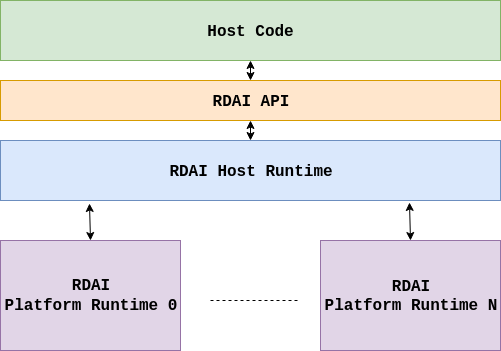RDAI is an API specification for accessing reconfigurable devices and hardware accelerators.
RDAI-enabled environments require 3 components to properly function:
RDAI API: a thin C-based APIRDAI Host Runtime: the execution broker. A host runtime is responsible for dispatching host API calls to appropriate platform runtimesRDAI Platform Runtime: software layer that controls a specific hardware platform (e.g. FPGA, CGRA, etc) and accelerators implemented on it
The execution model targeted by RDAI is host-directed execution with parallel accelerator devices. A host program runs on a CPU and manages the execution of accelerated tasks on attached accelerator devices. Accelerator devices are configured within a hardware platform. A hardware platform can be an FPGA, a CGRA, a virtual simulation platform, etc.
Each supported platform has to:
- provide an implementation of required APIs (a.k.a
RDAI_PlatformOps) - be registered with the host runtime before accelerator execution
Each platform is of a particular type and is allocated an ID during registration with the host runtime.
Each device is identified with a VLNV tag (Vendor-Library/Class-Name-Version) and an ID that is assigned by its containing platform.
